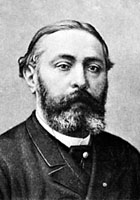Rene Francois Armand Prudhomme
Rene Francois Armand Prudhomme Poems
To sit and watch the wavelets as they flow
Two - side by side;
To see the gliding clouds that come and
And mark them glide;
...
Never to see or hear her,
never to name her aloud,
but faithfully always to wait for her
and love her.
...
The vase where this verbena is dying
was cracked by a blow from a fan.
It must have barely brushed it,
for it made no sound.
...
In this world all the flow'rs wither,
The sweet songs of the birds are brief;
I dream of summers that will last
Always!
...
The sound of bank and water is all I hear,
The sad resignation of a weeping spring
Or a rock that hourly sheds a tear,
And the birch leaves' vague quivering.
...
Along the quay, the great ships,
that ride the swell in silence,
take no notice of the cradles.
that the hands of the women rock.
...
Ye who will help me in my dying pain,
Speak not a word: let all your voices cease.
Let me but hear some soft harmonious strain,
...
POÈTES à venir, qui saurez tant de choses,
Et les direz sans doute en un verbe plus beau,
Portant plus loin que nous un plus large flambeau
...
Rene Francois Armand Prudhomme Biography
Rene Francois Armand Prudhomme, the son of a French shopkeeper. He also went by the name of René François Armand Sully-Prudhomme and Sully Prudhomme. An eye disease terminated his training at a polytechnic institute where he hoped to become an engineer. Instead, his studies concentrated on literature. His first job was as a clerk in a factory office, which he left in 1860 to study law. Sully Prudhomme was a member of the Conference La Bruyere, a distinguished student society, and the favourable reaction from his fellow members encouraged him to go on writing poetry. His first volume, Stances et Poemes (Stanzas and Poems) (1865), was well reviewed by Sainte-Beuve and established his reputation. The volume was filled with fluent and melancholic verse inspired by an unhappy love affair. He was a leading member of the Parnassian movement, which sought to restore elegance, balance, and aesthetic standards to poetry, in reaction to the excesses of Romanticism. Sully Prudhomme combined perfection and elegance with philosophic and scientific interests, which are revealed, for instance, in his translation of the first book of Lucretius' De Rerum Natura (1878-79). Some of his other poetic works are: Croquis Italiens (Italian Notebook) (1866-68); Solitudes (1869); Impressions de la guerre (Impressions of War) (1870); Les Destins (Destinies) (1872); La Révolte des fleurs (Revolt of the Flowers) (1872); La France (1874); Les Vaines Tendresses (Vain Endearments)(1875); La Justice (1878); and Le Bonheur(Happiness) (1888). Les Epaves (Flotsam) (1908), published posthumously, was a collection of miscellaneous poems. A collected edition of his writings in five volumes appeared in 1900-01. He also wrote essays and a book on Pascal, La Vraie Religion selon Pascal (Pascal on true Religion) (1905). He was awarded the first Nobel Prize for Literature in 1901. Sully Prudhomme was a member of the French Academy from 1881 until his deah in 1907.)
The Best Poem Of Rene Francois Armand Prudhomme
At The Water's Edge
To sit and watch the wavelets as they flow
Two - side by side;
To see the gliding clouds that come and
And mark them glide;
If from low roofs the smoke is wreathing pale,
To watch it wreath;
If flowers around breathe perfume on the gale,
To feel them breathe;
If the bee sips the honeyed fruit that glistens,
To sip the dew;
If the bird warbles while the forest listens,
To listen too;
Beneath the willow where the brook is singing,
To hear its song;
Nor feel, while round us that sweet dream is clinging
The hours too long;
To know one only deep over mastering passion -
The love we share;
To let the world go worrying in its fashion
Without one care -
We only, while around all weary grow,
Unwearied stand,
And midst the fickle changes others knows,
Love - hand in hand
